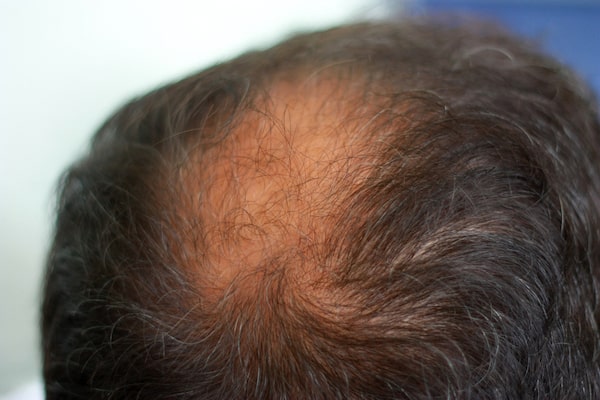A report from the American Academy of Dermatology (AAD) states that there are several potential reasons for hair loss on the scalp of a patient. It is important, however, to distinguish between hair shedding and hair loss. Shedding some hair is absolutely normal on a daily basis. On average, a person loses 50 to 100 hairs each day. Actual hair loss results in visible thinning or patches of hair loss on the head.
It can be difficult to determine the cause of hair loss. Factors that can contribute to hair loss are hormone changes, stress, weight loss and medications. But hair loss from these causes does not have to be permanent. There are many options for a long-lasting hair loss treatment depending on the type of hair loss suffered by the patient.
Types of Hair Loss
 There are several types of hair loss and Androgenetic Alopecia and Telogen Effluvium are two of the most common hair loss causes. Androgenetic Alopecia affects men and women and is usually genetic in nature. People who have Androgenetic Alopecia have more androgens in their hair follicles than other people. Androgens are a type of hormone and these androgens shorten the growth cycle of the hair and they also can cause thinner and shorter strands of hair that do not regrow quickly after they are shed.
There are several types of hair loss and Androgenetic Alopecia and Telogen Effluvium are two of the most common hair loss causes. Androgenetic Alopecia affects men and women and is usually genetic in nature. People who have Androgenetic Alopecia have more androgens in their hair follicles than other people. Androgens are a type of hormone and these androgens shorten the growth cycle of the hair and they also can cause thinner and shorter strands of hair that do not regrow quickly after they are shed.
Telogen Effluvium is hair loss that is related to stress and is seen as a general thinning across the scalp. The occurrence of severe or sudden stress can cause a large number of hair follicles to enter the sleep phase at once. The result is hair loss, or thinning hair, over a large section of the scalp.
Hair Loss Reasons
The first step in determining how to best deal with the specific type of hair loss is to identify its cause. There are multiple reasons for hair loss as shown below:
Heredity
Sometimes hair loss can be genetic. This type of hair loss is not considered to be a disease as much as a natural condition that can be caused by a combination of aging, genetics and the hormone levels of a person. In general, most men and women will experience some form of hair loss, or thinning of the hair, as they continue to age.
Hormones
Hair thinning can be caused by changes in hormone levels. A slight change in androgen levels may cause the hair on the head to thin. Women often notice changes in their amount of hair during menopause. Approximately two-thirds of women experience some hair loss during, and after, menopause.
Nutrition

Nutritional deficiencies are associated with both Androgenic Alopecia and Telogen Effluvium. Lower levels of some vitamins and minerals lead to hair loss. Low iron is a common issue that can lead to hair loss. Some women take iron supplements to help with hair loss but evidence has not proven its overall effectiveness for hair loss. Patients experiencing hair loss should check their levels of zinc, niacin, selenium and vitamin D.
Stress
It is common to experience hair loss when a person is going through times of elevated stress or anxiety levels. Some people consume less food when they are upset. A lower food intake can contribute to hair loss because it can increase the risk of vitamin and mineral deficiencies.
Thyroid Issues
Another possible cause of hair loss is thyroid dysfunction. If the hair is thinning, a patient may want to ask their physician to run tests to see if the thyroid gland is functioning properly. In fact, some health professionals recommend that any patient with hair loss be screened for thyroid issues.
Medications
There are several medications that have been linked to hair loss. Here is a list of some of the medications commonly associated with hair loss:
- Allopurinol (which is sometimes prescribed for people with kidney stones)
- Bromocriptine (which can be used to treat Parkinson’s disease)
- Cyclophosphamide (a chemotherapy drug)
- Levodopa (a medication-based treatment for Parkinson’s disease)
- Tamoxifen (used to treat breast cancer)
Weight Loss
Weight loss by itself is not always considered a potential hair loss cause. That does not mean a person will not experience hair loss if they lose a significant amount of weight. Dieting can stress the body and lead to nutritional deficiencies that result in hair loss.
Hair Loss Treatment Options
Once a patient begins to notice significant patterns of hair loss, it is a good idea to schedule a consultation appointment with a board-certified surgeon experienced in treating hair loss. The doctor can determine the cause of the hair loss and the best option to treat the issue. The doctor can also determine if the patient is an ideal candidate for a hair transplant to restore the look of the hairline and provide a full and healthy look to the hair. A hair transplant provides results that last a lifetime and are also natural in appearance.